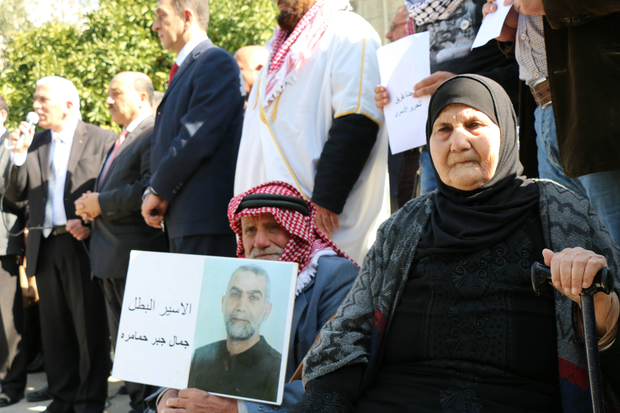Palestinians protest in West Bank and Gaza against violent Israeli prison raid

Israel Prison Service officers raided Palestinian detainees' cells at notorious military prison near Ramallah, injuring about 150 people
Palestinians demonstrated on Tuesday in the West Bank cities of Ramallah, Nablus and Hebron, as well as in the Gaza Strip, in protest at a recent Israeli crackdown on Palestinian prisoners that injured more than 100 detainees.
Officers with the Israel Prison Service stormed the cells at Ofer military prison, a notorious facility near Ramallah in the occupied West Bank, on Monday in search of mobile phones, SIM cards and other banned items, local media reported.
About 150 prisoners were injured during the raid, including at least six who suffered from broken bones and about 40 others who sustained head injuries, according to Quds news website.
Most of the injured prisoners were taken to Israeli hospitals and returned to Ofer on Tuesday, Quds reported.
An Israeli special force called the Metzada unit fired tear gas into the prisoners' cells during the raid, local media reported, while the prisoners set at least one cell on fire in response.
Since the incident, Palestinian prisoners have announced they intend to launch a hunger strike in protest at their treatment.
Abdullah al-Zghari, director of the Palestinian Prisoner's Society, which supports Palestinian detainees, described the incident as an "attack on [the] prisoners".
"The security minister in Israel, Gilad Erdan, is launching coordinated attacks on prisoners. The strategy is to take all their rights, which they struggled to get over the years," Zghari said during a press conference on Tuesday.
More than 1200 Palestinians are currently detained at Ofer, including some who are held under administrative detention, a mechanism that allows the Israeli authorities to hold Palestinians indefinitely without charge or trial. At least 180 detainees currently at Ofer are minors.
"Many of the people here in this demonstration today were former prisoners, who spent years in prison and went on hunger strikes to get these rights. Today they are here to protest for the rights of the Palestinian prisoners who are still in jail," Zghari said.
He said that while most of the injured prisoners were sent back to Ofer from the Israeli hospitals, about 20 prisoners are still "missing, and we do not know their status".
'I can't stop thinking of him'
One of the prisoners' relatives, Amneh Hamamreh, 75, from Bethlehem, said she was devastated when she heard about the attack and the subsequent launch of the hunger strike.
Her son Jamal, who is held at Ofer under administrative detention, is one of the leaders of the hunger strike. "I can barely stand. My son has spent more than 15 years in prison. He has four children. There is no one who can support them financially except my other son," she said.
Hamamreh told Middle East Eye she has not been able to visit her son for the last year for alleged "security reasons".
"I am an old woman, why won't they let me visit him?" she said.
"My son developed a heart condition in jail. I’m always in the house crying, I can’t stop thinking of him. When he would call me and describe his health situation to me, I would feel horrible. He was supposed to have surgery, but they didn't [allow him]," Hamamreh added.
She said she has not heard any news about her son since the attack.
While Jamal is expected to be freed on 10 February, Amneh said she is worried that recent events at Ofer may lead him to be "punished" - and not get released as planned.
She said Israeli soldiers ransacked her family's home on Monday evening in apparent retaliation for the hunger strike.
"They broke everything. They took many photos of my grandson, Jamal’s son," she said.
"They stayed for more than two hours, interrogating the children in the house. They said if my son, Jamal, doesn’t stop the hunger strike, they will keep doing this every night until he stops."
With additional reporting by Akram al-Wa'ara in Bethlehem
Source: Middle East Eye

WRITE YOUR COMMENT